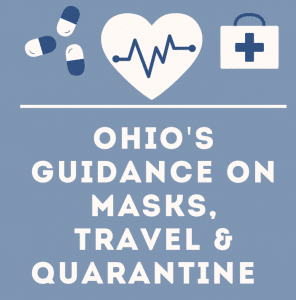On Wednesday July 22, Governor DeWine announced that at 6 p.m. on Thursday July 23, Ohioans would be required to wear masks in public. This includes when in indoor locations that are not residences, in outdoor places where social distancing of 6 feet cannot occur, and when waiting for or riding public transportation like a bus, taxi, car service, or ride-share. Governor DeWine stated that he believes that requiring masks across the state will make a significant difference and will be key to making sure counties do not progress to a higher level of increased spread. The new order only requires that individuals 10 years old and up wear a facial covering while other exemptions from the order are those with medical conditions or a disability, who are playing sports or exercising, who are officiants at religious serves, who are actively involved in public safety, or who are actively eating or drinking. The governor urged Ohioans to not be judgmental and assume that if someone is not wearing a mask, they have a legitimate reason they cannot wear it.
Dozens of other states have implemented face mask requirements including Indiana which also announced a mask mandate on July 22. Many of Ohio’s cities have implemented local mask mandates such as Columbus, Dayton, Cleveland, and Cincinnati. Previously, Governor DeWine had only mandated masks for counties with a level three or higher under the Public Health Advisory System. At the time of the statewide mask mandate announcement, 60% of Ohio’s residents were already mandated to wear masks under the system. Enforcement of the mask mandate falls to the Ohio Department of Health (ODH) and local health departments. The current penalty for violating the order is a misdemeanor with a punishment of up to 30 days in jail and a fine of $750. On Friday July 17, DeWine vetoed Senate Bill 55 which would have reduced the fines and banned jail time for violating public health orders.
Also on July 22, Governor DeWine announced a domestic travel advisory. The advisory recommends, not mandates, that travelers who have been in states with a high positive testing rate for COVID-19 quarantine for 14 days upon entering Ohio. Positivity rate indicates how much of the virus there is in a community and ODH recommends against travel to those states with high positivity. The states and territory that currently have a high positivity rate, set at 15% or higher, calculated by a 7-day rolling average are: Arizona, Nevada, Florida, Idaho, Alabama, Mississippi, South Carolina, Georgia, Puerto Rico, and Texas. The list of states of concern will be updated every Wednesday by ODH.
For the purposes of the travel advisory, ODH considers travel to another state as crossing into a state and interaction with individuals in that state. For example, if one is simply driving through one of the listed states and does not exit their vehicle, they do not need to quarantine. However, even those who had minimal contact with other people in a listed state should quarantine upon entering Ohio. Quarantine is recommended because it is the most effective methods of preventing the spread of the virus. The recommendation to quarantine applies to all of those who are traveling to Ohio from one of the listed states, regardless if they are an Ohio resident or not.
ODH published a COVID-19 checklist of strong recommendations for Ohioans who are isolated or quarantined. The foremost recommendation is staying home for 14 days unless medical care is needed and to not allow visitors. Keeping one’s distance is one of the most important aspects of isolation or quarantine as it minimizes the spread of the virus. Another recommendation is that, if possible, quarantined individuals should stay in a separate bedroom and use a separate bathroom from others in their household. If distance cannot be kept, masks should be worn, and people should remain at least 6 feet apart. ODH goes on to suggest that someone else in the home should prepare meals and leave them outside the bedroom door so that the quarantined person has less exposure to shared spaces. They also recommend that bedding, towels, and dishes should not be shared with others; if items must be shared, they should be cleaned before being used by another person. Quarantine means having zero or as little physical contact with others as possible which can be difficult for people who live alone or who feel socially isolated.
To keep people safe while they are helping others, ODH published recommendations on how to help people in quarantine. Since a quarantined person cannot shop in-person for themselves, having a friend or relative drop off food and drinks, prescriptions, and other essentials at their door can be helpful. Physically distant contact like calling, texting, or video chatting with the person can also lessen feelings of loneliness. If heeded, these recommendations may help slow the spread of the virus.

